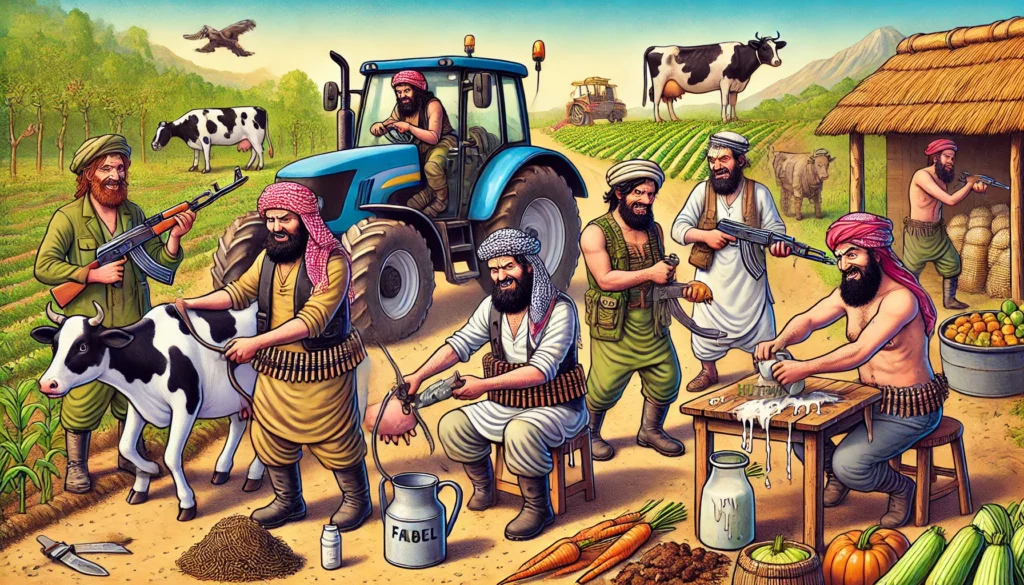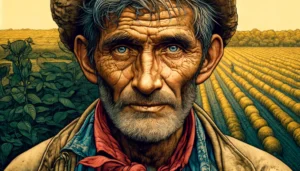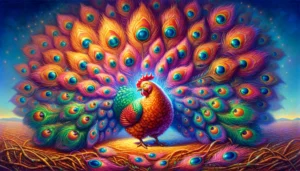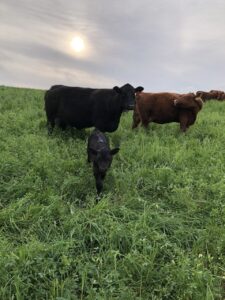
Houthi Rebels Houthi rebels humorously transitioning from terrorism to farming. The scene depicts former rebels dressed in a mix of traditional rebel attire and far1.webp.webp
Houthi Rebels Trade Terrorism for Tilling
Discover Farming Far More Dangerous
In a surprising turn of events that has left both military analysts and local farmers scratching their heads, the Houthi rebels have decided to abandon their life of terrorism and take up farming instead. Apparently, after years of causing havoc and dodging bullets, they found themselves increasingly bored. With no one attacking them and nothing left to blow up, they sought a new challenge. As it turns out, farming is not only not boring, but it’s also far more dangerous than they could have ever imagined.
With the American government not retaliating, Houthi rebels are now bored with the lack of excitement in terrorism, have traded their weapons for farming tools, discovering that agriculture is far from boring—and potentially more dangerous. Their transition from militants to farmers has been filled with humorous challenges: crop rotation confusion, the physical toll of tilling, and the unexpected hazards of hay bales and pests. Tasks like building barns (as opposed to blowing them up) and managing goats (as opposed to managing Al Jazeera) have proven to be formidable, often dangerous obstacles. Despite their military backgrounds, the rebels are finding that farming requires a unique blend of patience, skill, and resilience. From scarecrow mishaps to tractor troubles, they navigate their new, perilous occupation with a mix of stupidity and thick-headedness, ultimately realizing that the peaceful life of agriculture offers its own danger and excitement. — Abu Muhammad Ahmad Husain
From RPGs to Rakes
Who would have thought that switching from rocket-propelled grenades to rakes would be such a drastic change? “I miss the simplicity of an RPG,” one former rebel-turned-farmer lamented. “With a rake, you actually have to aim at the ground, and there’s no satisfying explosion at the end.”

Crop Rotation Confusion
In their first attempt at farming, the rebels quickly discovered that crop rotation doesn’t involve rotating crops like artillery shells. “We planted potatoes in the same spot for three seasons,” said Ali, a bewildered ex-combatant. “Now we have a potato famine on our hands. Who knew the soil could get tired too?”
The Terror of Tilling
Tilling the soil has proven to be a back-breaking task, far worse than any combat mission they’ve ever undertaken. “I’d take a battlefield over a field of rocks any day,” moaned Ahmed, who was nursing a sore back after a particularly grueling day of tilling. “At least on the battlefield, you don’t have to deal with weeds.”

Fertilizer Faux Pas
The rebels soon learned that not all explosions are created equal. “I thought fertilizer was supposed to make things grow,” said Youssef, a former bomb maker. “Turns out, there’s a delicate balance. Too much, and you end up with a crater where your cornfield used to be. My neighbors aren’t too happy about the fallout.”
Sheep as Surveillance
The rebels thought they could rely on sheep for surveillance. “They’re great at keeping an eye out for danger,” joked Zayd. “If only they could send reports instead of just bleating.” It turns out that sheep are more adept at chewing cud than alerting their human counterparts to threats.

Tractor Troubles
Switching from tanks to tractors wasn’t as seamless as they had hoped. “We’re used to driving over obstacles, not plowing around them,” said Khalid, who had accidentally driven his tractor into a ditch. “Apparently, you need a different kind of training to plow a field without causing a disaster. Tanks are easier to maneuver!”
Geopolitical Irony
In a twist of geopolitical irony, severe budget cuts in Iranian terrorism funding have forced Houthi rebels to abandon their militant activities and turn to subsistence farming on some of the worst soil on Earth. Stripped of their usual resources, the once-feared insurgents now face the harsh reality of trying to eke out a living from the barren, rocky terrain of Yemen. With no prior farming experience, the rebels find themselves bewildered by the challenges of agriculture, from crop rotation and soil fertility to pest control and irrigation.
Instead of strategizing ambushes, they’re now wrestling with unruly goats and malfunctioning tractors. Ali, a former Houthi commander, quipped, “Planning an attack was easier than figuring out when to plant potatoes.” Their military skills offer little help against the relentless sun and poor soil conditions, which turn even the simplest farming tasks into Herculean efforts.
Despite the grim conditions, the rebels-turned-farmers maintain a dark sense of humor about their plight. “Who knew fighting an enemy was easier than fighting weeds?” joked Ahmed, as he hacked away at the stubborn undergrowth. This unexpected shift from terror to tilling underscores the drastic measures necessitated by funding shortfalls, highlighting the ironic and often absurd consequences of geopolitical decisions.
A spokesperson for the United Nations’ Terrorist Rehabilitation Department commented on the situation, stating, “The transition of the Houthi rebels from armed conflict to agriculture is a testament to the impact of financial constraints on militant activities. While this development reduces immediate regional threats, it also reveals the challenging humanitarian conditions that persist in Yemen.”
Goats Over Guns
Goats have become the new guerrilla warriors on the farm. “Keeping these goats in line is tougher than commanding a battalion,” said Faisal, chasing after a particularly stubborn goat. “At least with soldiers, you can threaten court-martial. Goats don’t respond to that kind of discipline.
Water Woes
Finding water for crops has turned out to be a whole new kind of struggle. “Planning a covert operation is easier than setting up an irrigation system,” said Hamza, who was knee-deep in a muddy ditch trying to fix a broken pipe. “Who knew irrigation could be so complex?”

Farmers’ Market Mayhem
Selling produce at the local farmers’ market has presented unexpected challenges. “Haggling over cucumbers is more cutthroat than negotiating peace treaties,” laughed Omar, who found himself in a heated argument over the price of tomatoes. “I never thought selling veggies could be so intense.”
Pests are the New Enemies
“Pests are worse than enemy combatants,” groaned Hassan, swatting at a swarm of locusts. “At least you can see an opponent coming; aphids and locusts are sneaky little invaders.” Dealing with pests has proven to be a relentless and frustrating battle, with no clear end in sight.
Barn Building Blunders
Building a barn is not as straightforward as setting up a tent in the desert. “Structural integrity is a newfound priority,” said Mustafa, whose first attempt at barn construction ended in a spectacular collapse. “It turns out, you can’t just stack wood and hope for the best.”
Hay Bale Hazards
“Stacking hay bales should be simple,” thought Abdullah, until one toppled over and nearly flattened him. “Who knew hay could be so hazardous?” It seems that handling hay requires a level of precision and care that the rebels were not prepared for.
Scarecrow Snafus
Creating scarecrows has turned into an unexpected competition. “One rebel’s scarecrow looks so menacing, it scares away more neighbors than birds,” laughed Bilal. The scarecrows, with their military-inspired designs, have become a local attraction, drawing more curious onlookers than crows.
Crop Circle Misunderstandings
In an attempt to create efficient irrigation patterns, the rebels accidentally made crop circles. “The local conspiracy theorists had a field day,” chuckled Nasser. “They thought it was aliens. We just wanted to water our crops!” This misunderstanding has led to increased tourist traffic, much to the amusement of the former rebels.
Harvest Hiccups
Harvesting crops has proven to be a far cry from harvesting victory. “It involves more than just brute force,” said Rashid, who had been struggling with a particularly stubborn pumpkin. “You need patience and skill. Who knew farming required finesse?”
Conclusion: From Warfare to Weeding
Who would have thought that farming could present more challenges than terrorism? The Houthi rebels have traded one battlefield for another, and they’re finding that agriculture is a whole new world of peril and unexpected twists. From crop rotation confusion to scarecrow snafus, their journey into farming has been anything but boring.
Despite the trials and tribulations, the rebels-turned-farmers are learning to appreciate the peaceful, albeit challenging, life of agriculture. “At least nobody is shooting at us,” said Ahmed with a weary smile. “Though sometimes, I think I preferred dodging bullets to dealing with these goats.”
The transformation from militants to cultivators has not only provided them with a new lease on life but has also brought a sense of humor to their daily struggles. As they navigate the rocky terrain of farming, they do so with the resilience and tenacity that once made them formidable fighters. Now, they are channeling that same energy into growing crops, raising livestock, and perhaps, one day, mastering the art of the scarecrow.
In the end, the Houthi rebels have discovered that farming is not just about producing food; it’s about perseverance, innovation, and sometimes, sheer stubbornness. They have found a new kind of danger and excitement in agriculture, one that tests their limits in unexpected ways. And who knows? Maybe one day, they’ll be known not as rebels, but as the best darn farmers in the region.
Originally Published at FarmerCowboy.com
2024-06-28 10:34:02
Originally posted 2024-06-30 03:30:12.
Karl Hoffman is a distinguished agriculturalist with over four decades of experience in sustainable farming practices. He holds a Ph.D. in Agronomy from Cornell University and has made significant contributions as a professor at Iowa State University. Hoffman’s groundbreaking research on integrated pest management and soil health has revolutionized modern agriculture. As a respected farm journalist, his column “Field Notes with Karl Hoffman” and his blog “The Modern Farmer” provide insightful, practical advice to a global audience. Hoffman’s work with the USDA and the United Nations FAO has enhanced food security worldwide. His awards include the USDA’s Distinguished Service Award and the World Food Prize, reflecting his profound impact on agriculture and sustainability.



